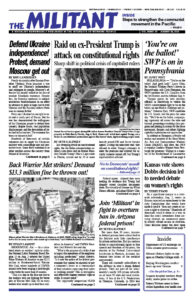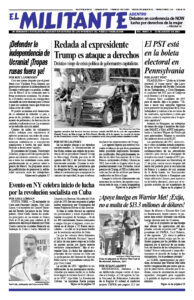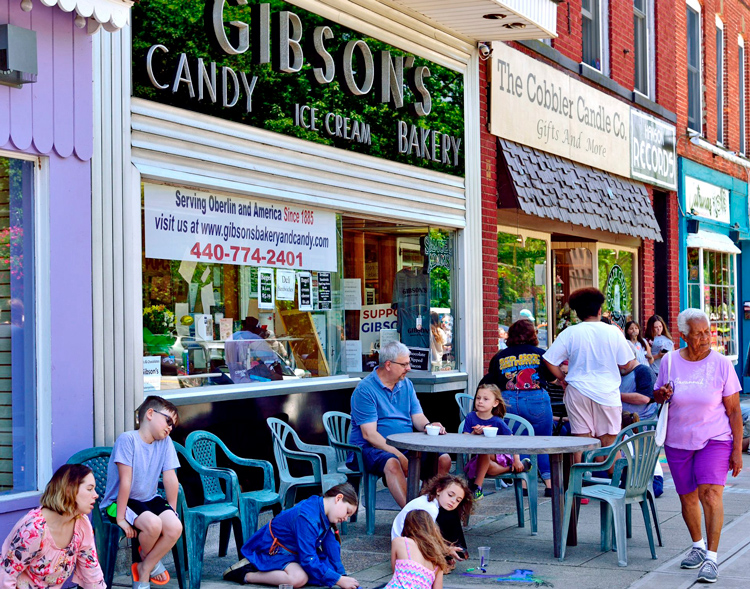On Aug. 9 the Supreme Court of Ohio granted Oberlin College a stay from having to pay damages long owed the Gibson family until the court can review a pending appeal filed by the school.
Attorneys for the Gibson family filed an urgent request July 26 with Lorain County Court Judge John Miraldi, asking that millions in damages, attorney’s fees, and interest be paid to them immediately.
The judge presided over a six-week jury trial in 2019 that found Oberlin College and Dean of Students Meredith Raimondo guilty of a race-baiting slander campaign against the family and their store, Gibson’s Bakery. The jury awarded $44 million in damages to the Gibsons. The judge later reduced damages to $20 million based on a state law that limits such awards.
Lee Plakas, an attorney for the Gibsons, explained in the request that the 137-year-old, fifth-generation family business may not survive the continuing consequences of Oberlin’s malicious conduct. “Unless there is a substantial change in circumstances,” Plakas said, “the bakery may only survive for the next couple of months.” With attorney’s fees and interest accruing at more than $4,331 per day since 2019, the Gibsons are owed more than $36 million.
Ohio’s Ninth District Court of Appeals heard Oberlin College’s appeal and unanimously upheld the jury’s verdict on March 31 and ordered the Lorain County Court “to carry this judgment into execution.” Yet months later not a single cent has been turned over to the Gibson family.
Race-baiting, moves to break family
In 2016, an Oberlin College student who is Black was caught shoplifting and arrested with two friends at Gibson’s Bakery. The next day hundreds of students and college administrators, including Raimondo, protested outside the bakery. Raimondo passed out flyers accusing the Gibsons of racism and racial profiling. The dean provided students with food, gloves, and use of college copiers. She instructed the college’s catering vendor to cancel Gibson’s longstanding contract to supply baked goods to the campus, an instruction that still stands today.
College administrators demanded special treatment for their students, telling the Gibsons to drop criminal shoplifting charges against the three students and insisting that the school be called instead of the police when their students — who pay $70,000 for tuition and room and board annually — are caught shoplifting.
When the Gibsons took the school to court for slander and damage to their business, the school hunted high and low but couldn’t come up with a single person to testify that the Gibsons had a history of racial profiling or discrimination. Former college President Marvin Krislov testified at the 2019 trial that during his 10-year tenure no one had ever suggested that the Gibsons were racists.
Instead of accepting the jury’s verdict, current Oberlin College President Carmen Twillie Ambar vowed at the end of the trial the appeals would become a “lengthy and complex process.” The ongoing financial pressure is aimed at crushing the family. The school has more than $1 billion in assets and one of the most prestigious art collections of any college in the U.S.
In their appeal to the state Supreme Court, Oberlin’s attorneys argue First Amendment rights of free speech are at issue. They have enlisted an armada of support from media, professional associations, and civil rights groups, including the NAACP, which submitted a friend of the court brief recalling the role of student activism during the Civil Rights Movement and the importance of First Amendment free speech rights.
But the narrative pedaled by the college’s attorneys and echoed in the friend of the court briefs has nothing to do with the trial record, the students or the right of free speech. The Gibson lawsuit did not sue the students, but was filed against Oberlin College and former Dean Meredith Raimondo for their intentional interference with the Gibsons’ business and for libel. The appeals court found the “free speech” argument utterly unpersuasive.
The state Supreme Court is not required to hear Oberlin’s case. In filing their appeal, Oberlin College’s attorneys failed to meet a deadline to request a stay or hold on having to pay the Gibsons pending the appeal. Belatedly realizing their error, they asked the court for relief, which was granted despite objections from lawyers for the Gibson family.
Historically, Ohio’s Supreme Court has agreed to hear only about 10% of the appeals filed with it. The Gibsons have appealed as well, asking for reinstatement of the full damages awarded by the jury, noting that the reduced judgment amounts to less than 3% of Oberlin College’s net worth. “Minimizing the jury’s punitive damages award is unconstitutional as applied to this case,” attorneys for the Gibsons said in their appeal, “where Oberlin intentionally and viciously annihilated the Gibsons’ reputations and livelihoods.”


